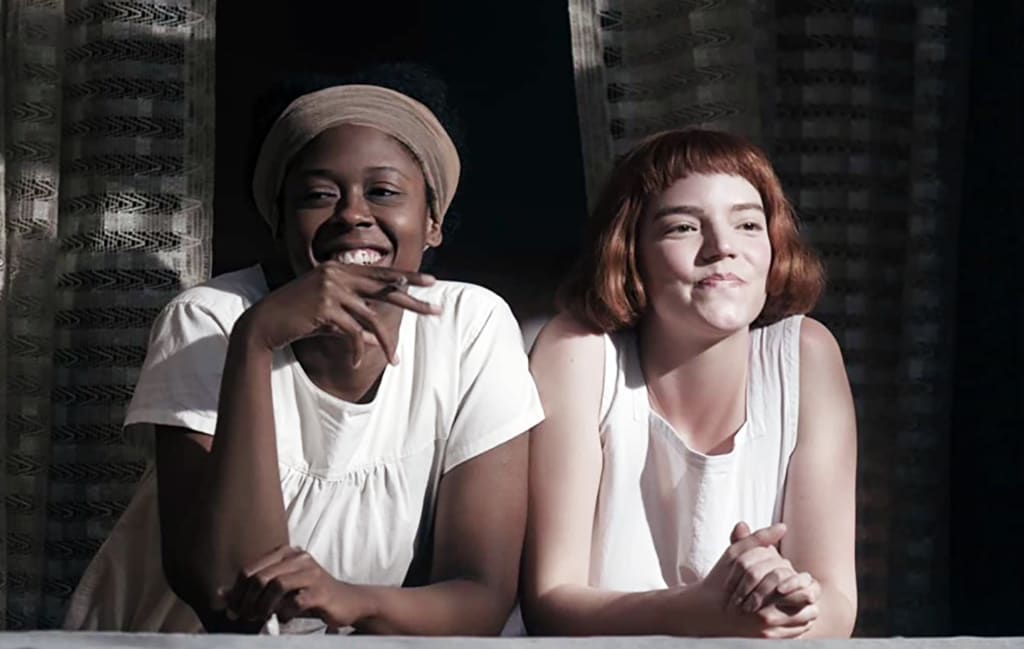
I’ve watched this series all the way through twice now, and on my first watch, I knew the critiques were coming. When Jolene (Moses Ingram) reappears in the second-to-last episode, I thought “Uh oh… here they come.” And come they did. Bitch was quick to call out the series, as was The Mary Sue, even the Washington Post: Jolene’s character is tokenized, they say, and even worse, an example of the “Magical Negro” trope (in which Black characters appear to save white characters, sometimes—though not always—by mysterious or supernatural means). I thought these very same things when Jolene reappeared at Beth’s darkest moment to pull her from the depths. When we first meet Jolene, she is stereotypically brash and loud-mouthed, and she remains always secondary to the white protagonist’s narrative. Jolene’s return adds something even less forgivable when she steps in at the eleventh hour to “rescue” Beth at the story’s climax, implying that her purpose is only ever in service of her white counterpart. This is purely bad representation. Isn’t it?
I want to be clear up front that at the surface level of storytelling, these criticisms are entirely valid, warranted, and just. Because she is the only Black character in the series (a problem in itself), Jolene carries the weight of all racial representation, and fits too comfortably into the long, tired history of the “Black best friend” trope in stories featuring white women protagonists. But hear me out: in a narrative that has never promised to do anything but center a white character (and gives no other characters significant depth or back stories), Jolene serves a deeper purpose than mere tokenism. She is, in fact, the lynchpin of the narrative’s subtextual storyline about internal conflict and trauma. Because this series is about much more than a white woman who is good at chess.
Beth Harmon’s primary character flaw is that she runs from her past without looking back. At nine, her distressed mother presumably tries to kill them both in a car accident: Her last words to Beth are, “Close your eyes.” So Beth does. She buries memories of her mother, and the trauma surrounding her death, and ploughs through all pain that follows (the loss of friendships, another mother’s death) with those same backward blinders, stomping into the future like she does into the world of chess. Beth moves on relentlessly, to her own detriment, deeper into loneliness and addiction.
When Jolene appeared at the end of episode six, I yelled at my TV in joy. Her character had been the dangling thread tying Beth to a central nexus in her past: the orphanage that marked three simultaneous and foundational events in her life. First was the traumatic loss of her mother (symbolized in a heartbreaking scene in which her carefully embroidered dress is stripped from her body and burned). Second was the beginnings of her addiction, and third, of course, her obsession with chess. Jolene is the only character in the series to bear witness to these originating moments, and so she is the only character who can bring Beth (literally—in her car) back to them. Beth cannot grow as a character or move forward in the narrative without facing those past traumas, and Jolene is the one who still connects her to them.
Ultimately, The Queen’s Gambit is a fantasy: an aestheticized and carefully constructed narrative centering one character’s growth and ultimate triumph. Beth spends the first six episodes climbing up in the world of chess, but accumulating traumas and alienating people (or so she thinks) along the way. In the final episode, she must learn to look back, and in doing so, she sees that she was never really alone. While she’d been too afraid to confront her past, her friends had always been there, ready to catch her if she fell. This is the purpose that most side characters in this story serve. But Jolene, whose relationship with Beth is rooted deepest in the past, is the key that unlocks this revelation.
Jolene does bear many of the marks of a tokenized Black character, and this is something that deserves criticism. But in the end her role in the structure of this story is much more powerful than token racial representation. Jolene represents history, and history can help us heal.
About the Creator
Beth Doane
Beth recently earned a PhD in literature and women's studies with research and writing focused on horror and weird fiction, especially how these genres deal with gender and race. She spends her time between Brooklyn and central PA.






Comments
There are no comments for this story
Be the first to respond and start the conversation.